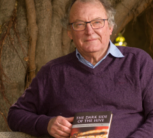Professor Robin Crewe was born in Johannesburg and studied at the University of Natal in Pietermaritzburg and at the University of Georgia, Athens, Georgia, USA for his PhD. For a period of ten years (1986-1996) he was the Director of the Communication Biology Research Group of the University of the Witwatersrand where a major focus of the group’s work was the study of honeybee chemical communication systems. He established the Social Insects Research Group (SIRG) at the University of Pretoria, which continues with studies of social insects under the direction of Prof Christian Pirk.
He was a Vice-Principal of the University of Pretoria from 2003 until his retirement from this position in June 2013. He is a past president of the Academy of Science of South Africa. His current research is focused on chemical communication and social organisation in honeybees and ants, particularly with respect to worker reproductive regulation.
He is the Chair of the Special Projects Committee of the South African Council for Natural Scientific Professions, Convenor of the APIMONDIA Africa Working Group on Honey Standards and Adulteration, Member of APIMONDIA Working Group on Adulteration of Bee Products.
He is a Fellow of the Royal Entomological Society of London, a Fellow of the Royal Society of South Africa, a Fellow of the World Academy of Sciences, a founding member of the Academy of Science of South Africa, a Fellow of the African Academy of Science, a Foreign Associate of Hassan II Academy of Science and Technology in Morocco and was awarded the Gold Medal of the Zoological Society of South Africa, and honorary life membership of the Entomological Society of Southern Africa. He was awarded the prestigious Harry Oppenheimer Fellowship for 2012 and the ASSAf Gold Medal for meritorious service in 2013. In 2019, he was the winner of the National Science and Technology Forum-South32 Award for a contribution to Science over a lifetime. He is currently a Senior Research Fellow in the Centre for the Advancement of Scholarship at the University of Pretoria.
1. What first got you interested in entomology and bees in particular?
My interest in chemistry and biochemistry when I was a student, attracted me to the study of chemical communication systems in insects that were being explored for the first time when I started doing research. This lead to a life-long fascination with these systems.
2. What is the most fascinating thing about bees that most people don’t know?
Most people don’t realise that social interactions are controlled by a set of chemical signals produced by the queen.
3. With the widespread use of pesticides, there’s been a lot of talk of bees going extinct. What would happen to our world if that were the case?
The outcome is difficult to predict, since if bees were to go extinct then many other insect species would also go extinct with unpredictable consequences for humans. The immediate effect of the loss of honey bees would be a dramatic decline in food production and hence large-scale food shortages that would likely lead to famine.
4. You’ve studied communication among bees for many years as well as their society. What have been some of the key findings over the years?
We have defined the chemical mixtures that make up signals produced by queens and we’ve shown how these chemical signals can also be produced by workers if the social conditions in the colony change. We have explored the way these signals affect the physiology and behaviour of individuals within the colony.
5. Why do you think their society is so similar to ours or why do we see so many parallels between our society and theirs?
Bee societies appear to be well regulated, harmonious and led by a dominant individual. This has the appearance of similarity to autocratic human societies and leads to the feeling that such societies represent a ‘natural order’. However, the differences are striking in that honey bee societies consist almost exclusively of females and the queen, which is the reproductive individual and the large number of workers that are non-reproductive.
6. What do you do in your spare time?
I have become interested in flying quadcopter drones that can be used to study honey bees’ mating behaviour.
7. Do you chase bees away when they get too close to you?
I ignore them since they are unlikely to do anything to you. If you brush them away or swat at them, you stand good chance of being stung.
8. How many times have you been stung by bees?
When working with honey bee colonies, we get stung regularly.
More from this Researcher

 Story
Story
 Story
Story
 Infographic
Infographic
Get Social With Us
Download the UP Mobile App